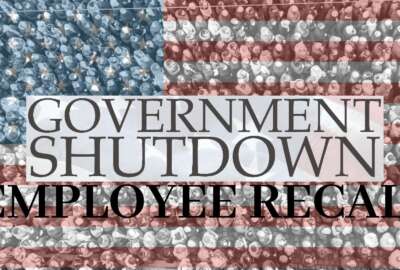
Shutdown and a taste of Armageddon
The current partial government shutdown, and the full shutdowns that preceded it are, in some respects, simulated shutdowns. They are very real for the people whose...
Best listening experience is on Chrome, Firefox or Safari. Subscribe to Federal Drive’s daily audio interviews on Apple Podcasts or PodcastOne.
This column was originally published on Jeff Neal’s blog, ChiefHRO.com, and was republished here with permission from the author.
More than 50 years ago (February 1967 to be exact), NBC aired an episode of Star Trek called A Taste of Armageddon. The plot involved two planets that had been at war for almost 500 years. Rather than destroying their planets, the governments had agreed to a computer-simulated war — similar to a war game — where the victims of simulated attacks were identified and expected to report to disintegration chambers to be executed. The war was neat and tidy, and the leaders had no real reason to end it.
Readers can probably see where I am going with this. The current partial government shutdown, and the full shutdowns that preceded it are, in some respects, simulated shutdowns. They are very real for the people whose pay relies on appropriated funds, but in many other respects they are not shutdowns at all. And that is the problem.
An interesting article in The Washington Post posited that the partial shutdown is good for advocates of smaller government, because it shows that many government jobs are “nonessential” and therefore agencies can safely be reduced. That would be a sound argument if it were based on fact. The truth is that a government shutdown does not tell us anything about the effects of dramatically reducing staffing in agencies, because the shutdowns, much like the attacks in A Taste of Armageddon, are simulated.
The Justice Department and the Office of Management and Budget have ruled that government can continue operating during a lapse of appropriations (the technical term for politicians not doing their jobs) if those operations are necessary to protect life, property or national security. From one perspective, that makes a lot of sense. Who would want to see government activities cease when someone could die?
And that is where the problem lies. We have entered into an era where shutdowns are becoming more common. The current partial shutdown shows no signs of ending, and people who are not directly affected by it wonder if it really means anything for the government to shut down. I could understand how someone might feel that way. That’s because the true effects of a shutdown are masked by the exceptions that keep things from blowing up. Congress and the White House protect themselves from the consequences and, in many respects, conceal those consequences from the public.
Those consequences are significant. The obvious one is that 800,000 people are not getting paid. If the federal workers who are not being paid but have been ordered to work refuse, they could be fired. Imagine a world where your employer can refuse to pay you and then fire you for not coming to work. Then there are the contractors. They may be told to not work, but are unlikely to be paid. There are other people who are harmed financially who will get zero relief.
More Government Shutdown News
And that is only the financial hardship for people and businesses. What about the agencies that rely on the agencies that are shut down? What happens to an agency that is working now because they have a working capital fund rather than appropriated dollars? The money may run out, then they will be shut down. What happens to the agencies that have deferred important work because they are shut down? When they return, they will have backlogs that will last for months, or even years. Deferred maintenance in National Parks, already a problem before the shutdown, will be far worse. Paperwork that has not been processed will create backlogs in many agencies. Benefits will be delayed. Decisions that have been deferred will be delayed, and will cause future decisions to be delayed. And what about security operations that have been reduced to skeleton crews? And furloughed support staff for law enforcement personnel? The list can go on and on.
The fact that we are seeing more people being brought back to work (such as Internal Revenue Service employees returning to pay tax refunds), demonstrates that there is eventually a political price to be paid for a shutdown, and politicians do not like the prospect of that.
In A Taste of Armageddon, Captain Kirk destroyed the computers and communications systems that allowed the two planets to continue their simulated war. Faced with the prospect of mutual annihilation, the governments decided peace was a better choice.
Perhaps we would be much better off if the consequence of a lapse in appropriations was a real shutdown. If we did not allow for countless exceptions, and we did not expect hundreds of thousands of employees to continue working with no pay while the President and Congress continue to be paid, we would have our own taste of Armageddon. The borders would be open. International commerce would grind to a halt. Air travel would stop. The military would go home. In fact, there would be no money to keep those buildings open. There would be no food safety inspections. No drug approvals. No one guarding the Capitol or the White House. No work at the vital National Institutes of Health and the Centers for Disease Control. Nothing. And anarchy. Then, and only then, would we see the true consequences of really shutting down the government.
If the result of Congress and the White House not reaching agreement on annual appropriations before the beginning of the fiscal year was that kind of Armageddon, we would never see another shutdown. That’s because it would be followed by an even worse kind of nightmare scenario for politicians — being voted out of office in the next election.
Jeff Neal is a senior vice president for ICF and founder of the blog, ChiefHRO.com. Before coming to ICF, Neal was the chief human capital officer at the Homeland Security Department and the chief human resources officer at the Defense Logistics Agency.
Copyright © 2025 Federal News Network. All rights reserved. This website is not intended for users located within the European Economic Area.





